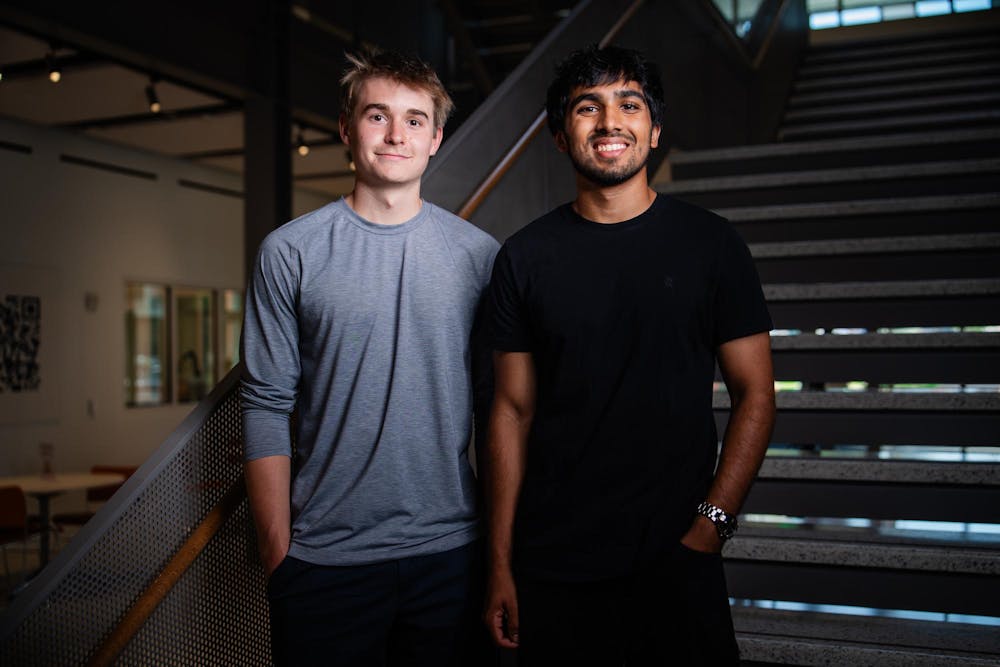Students keen on using artificial intelligence on Grounds may look no further than the Business and Artificial Intelligence Institute at U.Va., a recently-established Contracted Independent Organization that offers AI and machine learning opportunities to students. At a time when the University is hastening to keep up with strides in AI technology, BAI encourages students to step out of the classroom and experience the rapidly expanding AI climate for themselves.
Founded one year ago by third-year Commerce student Jack Deutsch and third-year College student Ali Rizwan, BAI joined a small number of existing data science CIOs on Grounds. Now, BAI is at the forefront of AI developments in the undergraduate student body. The CIO invites its general members to attend lectures about AI-related current events and to complete bootcamp-style education modules. For students interested in client-facing work, BAI also organizes project teams in which selected applicants develop free AI services to optimize the productivity of local and national businesses.
Rizwan said BAI’s primary mission is to keep AI within reach regardless of a student’s familiarity with the technology. He said BAI caters to anyone, whether one is a pre-health student interested in applying AI to radiology or a public policy student interested in discussing AI’s ethical implications.
“A student should not look at U.Va. and say, ‘I don't know how I can get involved with AI,’” Rizwan said. “We want to be the club where — if someone thinks, ‘I want to talk about AI, I want to learn about AI, I want to use AI’ — immediately, you point to BAI.”
Deutsch and Rizwan initially floated the idea of BAI over the summer of 2023. With AI booming and the one-year mark of ChatGPT’s release approaching, the two students sought to engage in real-world applications of AI. Struck by the limited options for them to do so on Grounds, the duo founded BAI that fall — pitching the CIO as a unique mix of business and technology — recruited their inaugural members and, shortly afterwards, partnered with their first clients.
Since then, BAI has hit several milestones. Last semester, BAI became the first CIO to partner with the School of Data Science. This semester, they became the first CIO to give a presentation in the School of Data Science building’s Capital One Hub, with Deustch and Rizwan speaking in front of the space’s two-story-high screen. And this past week, BAI secured a partnership with Perplexity AI, an AI-powered search engine which Deustch and Rizwan hope to make accessible on Grounds through an upcoming two-week campaign — according to Rizwan, the company has promised the University a free, one-year subscription to Perplexity Pro if 500 students create a Perplexity AI profile with their University email.
With the CIO’s foundation established, Deustch and Rizwan are now turning their attention to their project teams. The CIO currently serves five clients, ranging from an entertainment marketing agency to a healthcare business, and Deustch said he and Rizwan plan to expand this number even more.
“Now that we have the groundwork laid … we can hit the ground running immediately with projects and start building for a full year,” Deutsch said.
BAI’s growth at the undergraduate level reflects wider, growing support for data science at the University. Brian Wright, director of Undergraduate Programs for the School of Data Science, said he is excited to see undergraduate students strengthen their connection with the School of Data Science, as the school’s new building offers a community space and resources for organizations like BAI.
Wright specifically commended BAI’s client-facing work, saying the CIO’s projects get right to the heart of data science. He said in a field historically rooted in industry and still firmly embedded in companies like Meta and LinkedIn, BAI’s professional projects exemplify a crucial purpose of data science — to apply scientific techniques to real-world problems.
“[BAI] was just a perfect match for what we would want anybody that's interested in data science to be doing,” Wright said. “There's a lot of things we just can't teach unless you go out and do projects.”
Alongside organizing their project teams, Deustch and Rizwan are ensuring that the ethics of AI remain a central pillar of their organization. Last spring, they hosted Rick Campanelli, lecturer at the Frank Batten School of Leadership and Public Policy, who spoke on the ethics of AI. Looking ahead, the two co-founders have laid out plans to further educate students on AI safety and the importance of using AI with a conscientious purpose.
“Yes, there are a ton of risks with AI,” Deutsch said. “But something that we wanted to highlight with BAI is that [AI] also has a tremendous capacity for good. That’s why we went out and specifically staffed these projects on a pro bono basis — so we could build things that would benefit the Charlottesville community and showcase how AI can be used responsibly and effectively with the proper oversight.”
As AI becomes incorporated into everyday life on Grounds, Deustch and Rizwan said they envision BAI as an educational and professional community for students. The co-founders hope that BAI continues to spearhead opportunities for any student interested in AI.
“BAI is meant to be the pinnacle of AI at U.Va.,” Rizwan said. “We founded BAI to be the center [through which] all AI related activities pass.”







